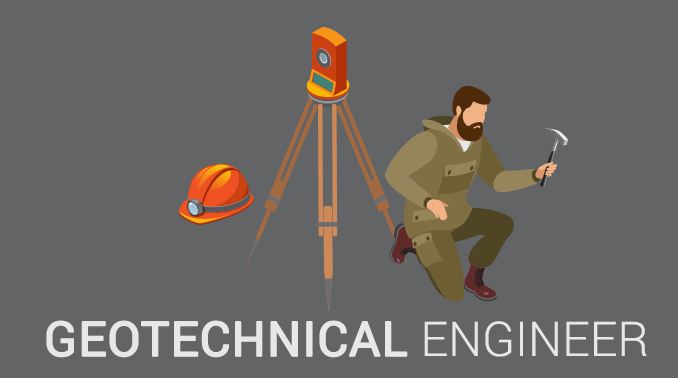Geotheta Things To Know Before You Buy
Geotheta Things To Know Before You Buy
Blog Article
Some Ideas on Geotheta You Need To Know
Table of ContentsRumored Buzz on GeothetaAll about GeothetaThe Single Strategy To Use For Geotheta10 Simple Techniques For GeothetaIndicators on Geotheta You Should Know

They perform website investigations, accumulate examples, perform lab examinations, and analyze information to assess the viability of the ground for construction projects - Consulting Engineers. Based upon their findings, geotechnical engineers supply recommendations for structure style, slope stability, preserving structures, and reduction of geotechnical risks. They collaborate with various other experts, such as engineers, structural engineers, and construction groups, to guarantee that geotechnical factors to consider are integrated right into the overall task design and application
By evaluating the actions and homes of dirt and rock, they can recognize possible geotechnical risks such as landslides, dirt settlement, or slope instability. Their expertise helps stop failures or accidents that might endanger lives and residential property. Right here are some detailed duties and duties of a geotechnical designer: Site Investigation: Geotechnical designers conduct website examinations to gather data on subsurface conditions.
They translate the data to recognize the residential properties and actions of the soil and rock, including their strength, leaks in the structure, compaction qualities, and groundwater problems. Geotechnical Evaluation and Style: Geotechnical engineers examine the data gathered throughout website investigations to evaluate the stability and viability of the website for construction projects. They execute geotechnical computations and modeling to examine factors such as bearing ability, negotiation, slope stability, side earth pressures, and groundwater circulation.
About Geotheta
Foundation Layout: Geotechnical designers play a critical duty in creating structures that can safely sustain the intended framework. They examine the soil conditions and load requirements to figure out the suitable structure type, such as shallow structures (e.g., footings), deep structures (e.g (https://www.slideshare.net/ianhammond2191)., piles), or specialized techniques like soil renovation. They consider factors such as negotiation limits, birthing capacity, and soil-structure communication to establish optimal foundation styles
They assess building plans, display site activities, and perform area evaluations to verify that the layout referrals are complied with. If unforeseen geotechnical concerns develop, they examine the situation and supply suggestions for removal or modifications to the design. Threat Analysis and Reduction: Geotechnical engineers evaluate geotechnical threats and threats associated with the task site, such as landslides, liquefaction, or soil disintegration.

Cooperation and Communication: Geotechnical designers work very closely with other experts involved in a task, such as architects, structural designers, and building groups. Effective communication and cooperation are essential to incorporate geotechnical considerations right into the overall job layout and construction procedure. Geotechnical designers provide technical proficiency, response questions, and guarantee that geotechnical requirements are fulfilled.
An Unbiased View of Geotheta
Here are some kinds of geotechnical designers: Structure Designer: Structure designers concentrate on designing and evaluating foundations for structures. They evaluate the soil conditions, lots requirements, and website qualities to figure out one of the most ideal structure kind and layout, such as superficial structures, deep foundations, or specialized techniques like pile structures.
They review the elements influencing slope stability, such as dirt buildings, groundwater conditions, and slope geometry, and establish methods to stop slope failures and minimize threats. Earthquake Engineer: Quake designers focus on evaluating and designing frameworks to hold up against seismic pressures. They evaluate the seismic hazard of a website, view publisher site examine dirt liquefaction possibility, and create seismic style criteria to ensure the safety and security and durability of structures throughout earthquakes.
They perform area testing, accumulate examples, and analyze the accumulated data to identify the dirt buildings, geologic formations, and groundwater problems at a website. Geotechnical Instrumentation Engineer: Geotechnical instrumentation designers concentrate on monitoring and gauging the habits of dirt, rock, and structures. They mount and keep instrumentation systems that keep track of variables such as soil negotiation, groundwater levels, slope activities, and structural variations to examine efficiency and supply very early warnings of prospective concerns.
What Does Geotheta Do?
They carry out examinations such as triaxial examinations, debt consolidation tests, direct shear tests, and permeability tests to gather information for geotechnical evaluation and design. Geosynthetics Designer: Geosynthetics engineers specialize in the style and application of geosynthetic products, such as geotextiles, geogrids, and geomembranes. They make use of these products to improve soil stability, reinforce slopes, offer drain options, and control disintegration.
They have a tendency to be investigative people, which suggests they're intellectual, reflective, and analytical. They wonder, methodical, rational, logical, and sensible. Several of them are likewise social, suggesting they're kind, generous, cooperative, person, caring, helpful, empathetic, sensible, and pleasant. Does this audio like you? Take our complimentary occupation examination to discover if geotechnical engineer is among your leading occupation matches.
In the workplace atmosphere, geotechnical designers make use of specialized software application tools to perform estimations, develop designs, and assess data. They prepare reports, testimonial task specifications, communicate with customers and staff member, and coordinate job tasks. The office setup provides a conducive atmosphere for research study, evaluation, and partnership with other experts associated with the job.
The 45-Second Trick For Geotheta
They often visit task sites to perform website investigations, analyze geotechnical conditions, and collect information for evaluation. These gos to involve taking a trip to different locations, sometimes in remote or difficult surfaces. Geotechnical engineers might do dirt tasting, conduct tests, and monitor building and construction tasks to ensure that the geotechnical elements of the job are being executed correctly.
Geotechnical engineers additionally function in specialized geotechnical laboratories. In these facilities, they carry out experiments, carry out tests on soil and rock examples, and analyze the engineering buildings of the products. Geotechnical research laboratory designers function extensively in these environments, handling screening tools, running tools, and videotaping information. They team up with various other laboratory team to ensure accurate and reputable screening outcomes.
Report this page